Please enjoy this encore post about religion in SFF, originally published November 2016.
Of all the genres, science fiction and fantasy are the ones where humans can tackle their deepest societal problems and thought experiments. Because of this, it’s a natural place for people to explore ideas about religion, faith, and the meaning of life…
Religion can also be an emotional and contentious topic for people. For people who choose to leave a religious tradition, science and science fiction can become the home they didn’t find in a church or temple, and can also provide a way to critique the life they left. For others, the flexibility of the genre allows them to express their faith, or their questions about their faith, in deeper ways than any other medium would allow.
I thought it would be interesting to look at some examples of books and short stories that have tackled religious questions in respectful and positive ways. While these stories sometimes go to uncomfortable places, they each take faith seriously, and would be worthy additions to the TBR stacks of believers and non-believers alike.
Witches of Lychford and The Lost Child of Lychford by Paul Cornell
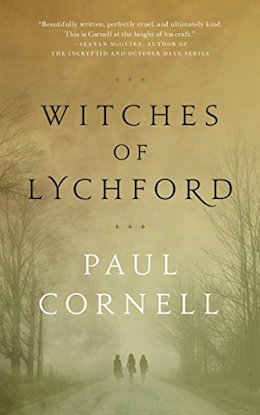 In Paul Cornell’s Witches of Lychford series, witches and religion coexist so peacefully that one of the titular witches is an Anglican vicar. Judith is an elderly witch, and she’s been keeping an eye on the town of Lychford her entire life. But when a big box grocery store threatens to open a gateway to a hellish dimension, she enlists two younger witches to help her. Autumn is a New Agey atheist who runs a magic shop, and her former best friend Lizzie is Lychford’s newly minted vicar—who is also suffering a crisis of faith and a terrible depression following the death of her partner. But both women were born with an inclination to witchery, as well. Once Judith baptizes them as witches, and teaches them how to see the spiritual elements around them, they can be practicing witches without disturbing their other spiritual practices.
In Paul Cornell’s Witches of Lychford series, witches and religion coexist so peacefully that one of the titular witches is an Anglican vicar. Judith is an elderly witch, and she’s been keeping an eye on the town of Lychford her entire life. But when a big box grocery store threatens to open a gateway to a hellish dimension, she enlists two younger witches to help her. Autumn is a New Agey atheist who runs a magic shop, and her former best friend Lizzie is Lychford’s newly minted vicar—who is also suffering a crisis of faith and a terrible depression following the death of her partner. But both women were born with an inclination to witchery, as well. Once Judith baptizes them as witches, and teaches them how to see the spiritual elements around them, they can be practicing witches without disturbing their other spiritual practices.
The religion is handled as deftly as the magic:
She found the space in her head where she prayed and she did that and there was nothing there to answer, as there hadn’t been for a while now, but after a minute or so she was able—as always—to get up and begin her day.
Not only is Lizzie’s faith, and lack thereof, treated respectfully throughout this book, but also her role as a vicar becomes central to the plot in the sequel, The Lost Child of Lychford, where her Christmas obligations become entangled with her magical practice in a terrifying way.
Alif the Unseen by G. Willow Wilson
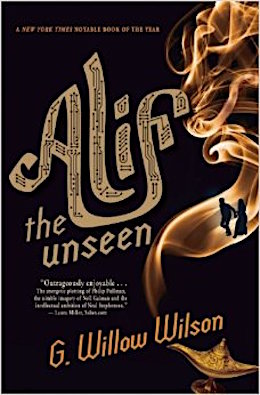 Alif the Unseen takes a similar tack, including faithful Muslims and a respectful treatment of Islam alongside a more magical tale of a group of djinn. Alif’s long-gone father is Muslim, but his mother was Hindu, so he lives in the margins of his primarily Muslim city. He helps both pornographers and revolutionaries online, staying just ahead of state censors… most of the time. But when he’s given a mysterious text called the Alf Yeom—which is the “1001 Days,” an inversion of the 1001 Nights—he finds himself in a much larger battle with the apparatus behind the state, a battle that he’s only going to win with a little help from his djinn.
Alif the Unseen takes a similar tack, including faithful Muslims and a respectful treatment of Islam alongside a more magical tale of a group of djinn. Alif’s long-gone father is Muslim, but his mother was Hindu, so he lives in the margins of his primarily Muslim city. He helps both pornographers and revolutionaries online, staying just ahead of state censors… most of the time. But when he’s given a mysterious text called the Alf Yeom—which is the “1001 Days,” an inversion of the 1001 Nights—he finds himself in a much larger battle with the apparatus behind the state, a battle that he’s only going to win with a little help from his djinn.
The novel features a range of approaches to Islam, including an imam who was also imprisoned by the state, who describes his faith:
I have had much experience with the unclean and uncivilized in the recent past. Shall I tell you what I discovered? I am not the state of my feet. I am not the dirt on my hands or the hygiene of my private parts. If I were these things, I would not have been at liberty to pray. . . . But I did pray, because I am not these things. . . . I am not even myself. I am a string of bones speaking the word God.
While the book’s plot is more concerned with Alif’s work as a hacker, the book returns to questions of religion repeatedly, to explore Islam as a faith and as an identity.
The Sparrow and Children of God by Mary Doria Russell
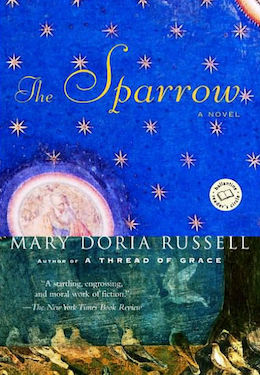 The Sparrow and Children of God caused a sensation when they first came out, and I remember reading both of them in a rush, completely taken with the way Mary Doria Russell took Emilio Sandoz’ religious faith as seriously as his linguistic studies. And I would still say this aspect of the book holds up—Emilio’s belief in God is fierce and unshakable, it just shifts from love and obedience, before Rakhat, to bitterness and resentment afterwards. Since he comes to believe that he and his friends have been used as tools, it forces him to look at the idea of “God having a plan” in a whole new way. That idea can be comforting, but when the God that you’ve dedicated your life to returns your love by treating you like a UPS package (not even the guy driving the truck—the package), it can kind of mess you up.
The Sparrow and Children of God caused a sensation when they first came out, and I remember reading both of them in a rush, completely taken with the way Mary Doria Russell took Emilio Sandoz’ religious faith as seriously as his linguistic studies. And I would still say this aspect of the book holds up—Emilio’s belief in God is fierce and unshakable, it just shifts from love and obedience, before Rakhat, to bitterness and resentment afterwards. Since he comes to believe that he and his friends have been used as tools, it forces him to look at the idea of “God having a plan” in a whole new way. That idea can be comforting, but when the God that you’ve dedicated your life to returns your love by treating you like a UPS package (not even the guy driving the truck—the package), it can kind of mess you up.
Both books look unflinchingly at Emilio’s feeling of betrayal, but they also explore the idea that the long game he’s caught up in more important than any of the people getting hurt. Russell is also careful to balance Emilio’s fervent beliefs with those of Sofia Medes, whose dedication to Judaism is treated just as respectfully as Emilio’s Catholicism. One of the highlights of the first book is their ongoing theological conversation, as she challenges him to explain his rituals and compares them to her own.
A Canticle for Leibowitz by Walter M. Miller
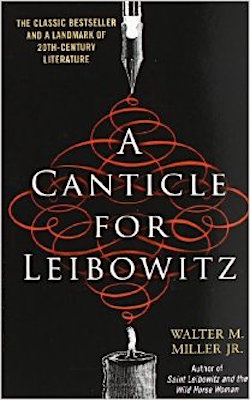 When I mentioned Long Game a minute ago—A Canticle for Leibowitz unfolds slowly over several centuries. We begin in a dark, post-apocalyptic dystopia, about 600 years after a nuclear war has destroyed civilization. A tiny monastery has formed in the desert, with monks who live by the tattered remnants of Catholicism, but who have a new saint—Edward Isaac Leibowitz. Leibowitz was an engineer who converted to Catholicism after the “The Flame Deluge” and spent the rest of his life trying to preserve books in the face of the “Simplification”—a dark period when the Deluge’s survivors rejected science and learning of any kind for fear that it would lead to another war. Those of you who understand how sainthood works should realize that Leibowitz is long dead at the beginning of the book, and was actually martyred by a pro-Simplification mob.
When I mentioned Long Game a minute ago—A Canticle for Leibowitz unfolds slowly over several centuries. We begin in a dark, post-apocalyptic dystopia, about 600 years after a nuclear war has destroyed civilization. A tiny monastery has formed in the desert, with monks who live by the tattered remnants of Catholicism, but who have a new saint—Edward Isaac Leibowitz. Leibowitz was an engineer who converted to Catholicism after the “The Flame Deluge” and spent the rest of his life trying to preserve books in the face of the “Simplification”—a dark period when the Deluge’s survivors rejected science and learning of any kind for fear that it would lead to another war. Those of you who understand how sainthood works should realize that Leibowitz is long dead at the beginning of the book, and was actually martyred by a pro-Simplification mob.
Of all the books here, Canticle probably has the most uncomplicatedly positive view of religion—which is hilarious, because it’s an incredibly bleak book. (But also funny!) The Catholicism of the post-apocalypse is all that holds society together, preserving knowledge and culture much as European monasteries did after the collapse of the Roman Empire. And while the church itself is just as harsh as it was during the Middle Ages (and has just as problematic a relationship to women), this future version of the Church is also even more dedicated to science and the promotion of education than its pre-Deluge counterpart. It is also completely committed to the idea that the Church is the sum of its parts, and that it will outlast human folly.
Ten Billion Days and One Hundred Billion Nights by Ryu Mitsuse
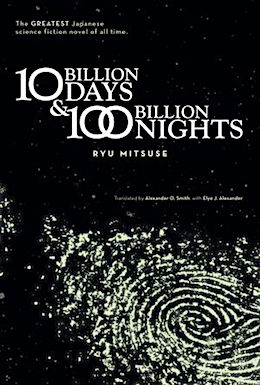 Ryu Mitsuse’s Ten Billion Days and One Hundred Billion Nights is an interesting take on religion (though not always a positive one) and mashes up figures from several different faiths into one time-spanning adventure. Written in 1967, and then revised and republished in 1973, the book has recently come out from Haikasoru and found a Western audience. Plato spends ten billion days studying “the true systems of the world” while Jesus, Siddhartha, and the demigod Asura spend One Hundred Billion Nights traveling to the future to witness the heat death of the universe. Now, this is where things get more interesting: “Asura” is usually a catch-all term referring to a group of demigods or demons in Hinduism, but here they’re personified by a single young girl. Plus, Jesus is a cyborg assassin? And he and Asura are fighting over the fate of life in the universe? The book can be read as a conversation between Christianity, Buddhism, and Hinduism, with some Greek philosophy thrown in for good measure… or just as a picaresque that is by turns wacky and unsettling, as the characters hurtle toward the end of all life in the universe.
Ryu Mitsuse’s Ten Billion Days and One Hundred Billion Nights is an interesting take on religion (though not always a positive one) and mashes up figures from several different faiths into one time-spanning adventure. Written in 1967, and then revised and republished in 1973, the book has recently come out from Haikasoru and found a Western audience. Plato spends ten billion days studying “the true systems of the world” while Jesus, Siddhartha, and the demigod Asura spend One Hundred Billion Nights traveling to the future to witness the heat death of the universe. Now, this is where things get more interesting: “Asura” is usually a catch-all term referring to a group of demigods or demons in Hinduism, but here they’re personified by a single young girl. Plus, Jesus is a cyborg assassin? And he and Asura are fighting over the fate of life in the universe? The book can be read as a conversation between Christianity, Buddhism, and Hinduism, with some Greek philosophy thrown in for good measure… or just as a picaresque that is by turns wacky and unsettling, as the characters hurtle toward the end of all life in the universe.
Lord of Light by Roger Zelazny
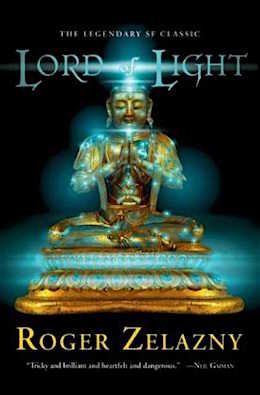 Roger Zelazny’s Lord of Light is set in the far future, where colonists from “vanished Urath,” or Earth, have set up shop on a planet full of understandably hostile indigenous people. In order to survive, they use their ships tech to mutate themselves and eventually to MacGyver a type of reincarnation by repeatedly transferring their souls into new bodies. They use this tech against the planet’s native population, setting themselves up as a pantheon of “Hindu” gods, and instituting an ironclad caste system. Obviously, they have to keep the tech out of the wrong hands in order to stay at the top of society… which is where Sam comes in. Originally named Mahasamatman, he prefers to go by just Sam, but before that he was Siddhartha. The Buddha. And now he’s decided to ally with the pantheon of the native people, reincarnate repeatedly, and generally go full trickster god to make sure everyone has access to technology, and end the tyranny of the caste system once and for all.
Roger Zelazny’s Lord of Light is set in the far future, where colonists from “vanished Urath,” or Earth, have set up shop on a planet full of understandably hostile indigenous people. In order to survive, they use their ships tech to mutate themselves and eventually to MacGyver a type of reincarnation by repeatedly transferring their souls into new bodies. They use this tech against the planet’s native population, setting themselves up as a pantheon of “Hindu” gods, and instituting an ironclad caste system. Obviously, they have to keep the tech out of the wrong hands in order to stay at the top of society… which is where Sam comes in. Originally named Mahasamatman, he prefers to go by just Sam, but before that he was Siddhartha. The Buddha. And now he’s decided to ally with the pantheon of the native people, reincarnate repeatedly, and generally go full trickster god to make sure everyone has access to technology, and end the tyranny of the caste system once and for all.
The Goblin Emperor by Katherine Addison
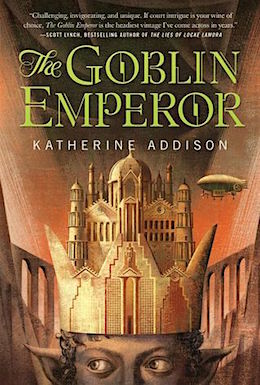 The Goblin Emperor was one of my favorite books of 2014. The main character, Maia, is a sweet, loving, but painfully shy young man who has grown up in exile as the fourth, unwanted half-goblin son of a powerful Elven emperor. When his father and three elder brothers die in an accident, Maia has to ascend to the throne, despite his lack of training or support. Maia has to fight his court on many fronts to prove his fitness to rule, but one of the most interesting challenges is religious. Officially, the Elven court worships several gods and goddesses, has regular religious services, and holds formal weddings, coronations, and funerals that all involve religious elements. They also employ people known as Witnesses for the Dead, who commune with those who have died by accident or foul play in order to determine justice. However, this religiosity seems to be mere lip service for most of the court, and there are references to fashionable skepticism when it comes to the gods. Maia, who spent the first few years of his life with his loving, mystically-minded mother, has a very different approach to faith. Not only does he sincerely believe in the goddesses he worships, but he also associates his beliefs with the only happy time in his life.
The Goblin Emperor was one of my favorite books of 2014. The main character, Maia, is a sweet, loving, but painfully shy young man who has grown up in exile as the fourth, unwanted half-goblin son of a powerful Elven emperor. When his father and three elder brothers die in an accident, Maia has to ascend to the throne, despite his lack of training or support. Maia has to fight his court on many fronts to prove his fitness to rule, but one of the most interesting challenges is religious. Officially, the Elven court worships several gods and goddesses, has regular religious services, and holds formal weddings, coronations, and funerals that all involve religious elements. They also employ people known as Witnesses for the Dead, who commune with those who have died by accident or foul play in order to determine justice. However, this religiosity seems to be mere lip service for most of the court, and there are references to fashionable skepticism when it comes to the gods. Maia, who spent the first few years of his life with his loving, mystically-minded mother, has a very different approach to faith. Not only does he sincerely believe in the goddesses he worships, but he also associates his beliefs with the only happy time in his life.
Plus, if he’s going to follow his religion properly, he needs to meditate, which requires solitude…which is the one thing, as Emperor, he’ll never have again. He has to find ways to assert his right to his religion, while also making sure his secular courtiers don’t think he’s a fanatic. This plotline is submerged fairly deeply in the novel, but hinted at throughout, and gradually becomes more important as Maia finds his footing as a ruler. Addison handles it delicately, showing the reader how Maia expresses his faith through his actions rather than trying to explain theological rules.
The Time Quintet by Madeleine L’Engle
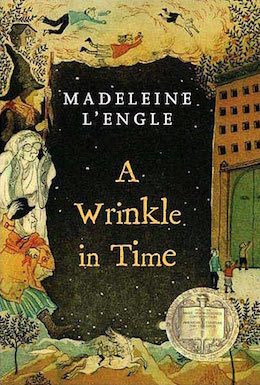 Madeleine L’Engle, like C.S. Lewis before her, wrote children’s sci-fi and fantasy, adult books, nonfiction, and Christian commentary. She wove religious themes into many of her books, but they’re particularly strong in her Time Quintet. A Wrinkle in Time is fairly notorious for its use of religious imagery. (I still remember when we studied AWiT in 7th grade, when we hit the chapter where centaurs sing about God, my teacher smiled at us and said, “And in this chapter, there are some religious themes that we are not going to talk about!” and hurried us on to Camazotz.) AWiT seems to be a straightforward sci-fi story when L’Engle takes a hard turn into religious territory, as Mrs. Who quotes the opening of the Gospel of John, and Charles Wallace responds by yelling out that Jesus is fighting the Black Thing. However, L’Engle keeps the story from becoming a pure vehicle for proselytizing when the three children name other historical figures who have fought, including Euclid, Copernicus, Bach, Gandhi, and the Buddha. This does two things: For a secular reader, they’ve just realized that they’re reading a story that has a spiritual element to it, but they’ve been reassured that they’re not going to be hit over the head with Gospel allegories. At the same time, a Christian reader might be offended to have Jesus show up simply as part of a list of great Earthlings. By introducing the religious aspect of the fight this way, L’Engle is marking her book as a liberal Christian story, that invokes Jesus and New Testament quotes, but also leaves room for other religions and science to be important elements in the human fight against hatred. This has led to the book being challenged and banned for either being too religious or not religious enough.
Madeleine L’Engle, like C.S. Lewis before her, wrote children’s sci-fi and fantasy, adult books, nonfiction, and Christian commentary. She wove religious themes into many of her books, but they’re particularly strong in her Time Quintet. A Wrinkle in Time is fairly notorious for its use of religious imagery. (I still remember when we studied AWiT in 7th grade, when we hit the chapter where centaurs sing about God, my teacher smiled at us and said, “And in this chapter, there are some religious themes that we are not going to talk about!” and hurried us on to Camazotz.) AWiT seems to be a straightforward sci-fi story when L’Engle takes a hard turn into religious territory, as Mrs. Who quotes the opening of the Gospel of John, and Charles Wallace responds by yelling out that Jesus is fighting the Black Thing. However, L’Engle keeps the story from becoming a pure vehicle for proselytizing when the three children name other historical figures who have fought, including Euclid, Copernicus, Bach, Gandhi, and the Buddha. This does two things: For a secular reader, they’ve just realized that they’re reading a story that has a spiritual element to it, but they’ve been reassured that they’re not going to be hit over the head with Gospel allegories. At the same time, a Christian reader might be offended to have Jesus show up simply as part of a list of great Earthlings. By introducing the religious aspect of the fight this way, L’Engle is marking her book as a liberal Christian story, that invokes Jesus and New Testament quotes, but also leaves room for other religions and science to be important elements in the human fight against hatred. This has led to the book being challenged and banned for either being too religious or not religious enough.
The rest of the Time Quintet continues this tap dance, as the children meet Cherubim, learn to love people they consider enemies, and discuss the value of sacrifice in A Wind in the Door; deal with an irascible angelic unicorn and cancel the apocalypse in A Swiftly Tilting Planet (whose title, by the way, is a line from a popular Celtic Catholic prayer called St. Patrick’s Breastplate); and literally help Noah build the ark in Many Waters. Then St. Patrick’s Breastplate is revisited a generation later, as Meg Murry’s daughter Polly recites it when she’s nearly sacrificed by ancient Celts after she accidentally goes back in time during a walk in the woods… look, it makes sense in context. The religion presented in the books is based in compassion and love, but doesn’t get too bogged down in denominations—the constant refrain is simply that the universe is much bigger than any of the individual character, and that everyone deserves space and respect, and that maybe your own narrow view of the world isn’t the only one.
“The Star” and “The Nine Billion Names of God” by Arthur C. Clarke
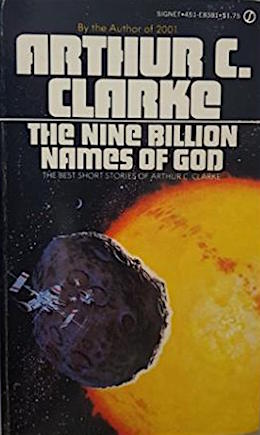 Arthur Clarke’s short story “The Star” is more in line with The Sparrow: A priest is coming home from a mission to the far reaches of the solar system. He and his fellow astronauts find the remains of a great civilization, that knew it was going to be wiped out in a cosmic event, and had enough time to preserve their culture and art in a massive archive. Without spoiling the story, what they find there rattles the priest’s faith in a particularly interesting way. The sudden shock of realizing that just because you believe there’s some sort of plan to the unfolding of the universe, doesn’t mean you’ll ever understand that plan. It doesn’t mean that the plan is “fair” according to your own narrow, mortal definition of that word. Likewise, “The Nine Billion Names of God” puts a pair of computer technicians in conflict with a group of Tibetan monks who are using a new computer to calculate the titular names of God, believing that this will cause the universe to reach it apex. Unfortunately (from a human point of view), that will also mean that the universe will reach its end…
Arthur Clarke’s short story “The Star” is more in line with The Sparrow: A priest is coming home from a mission to the far reaches of the solar system. He and his fellow astronauts find the remains of a great civilization, that knew it was going to be wiped out in a cosmic event, and had enough time to preserve their culture and art in a massive archive. Without spoiling the story, what they find there rattles the priest’s faith in a particularly interesting way. The sudden shock of realizing that just because you believe there’s some sort of plan to the unfolding of the universe, doesn’t mean you’ll ever understand that plan. It doesn’t mean that the plan is “fair” according to your own narrow, mortal definition of that word. Likewise, “The Nine Billion Names of God” puts a pair of computer technicians in conflict with a group of Tibetan monks who are using a new computer to calculate the titular names of God, believing that this will cause the universe to reach it apex. Unfortunately (from a human point of view), that will also mean that the universe will reach its end…
“The Man” and “The Fire Balloons” in The Illustrated Man by Ray Bradbury
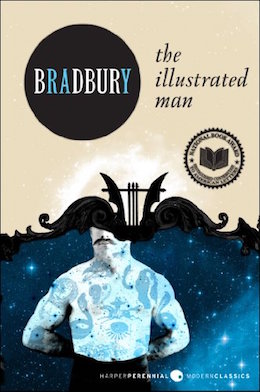 Ray Bradbury took a similar tack in several stories in his classic collection, The Illustrated Man, but tackled question of religion from two different directions. Both focused on Christianity. In “The Man,” a pair of interstellar explorers named Hart and Martin come to a planet where the entire population seems to be ecstatically happy; and when the suspicious captain questions the people, he learns that a holy man has visited the planet and brought peace to everyone. “He didn’t have a name. He didn’t need a name. It’d be different on every planet, sir,” Martin tells Captain Hart. (Spoiler alert, it’s Jesus, he’s been planet-hopping for the last few thousand years, and he’s finally found one where people don’t murder him for suggesting we should all be nice to each other.) The captain has a psychotic break over this information, first insisting that the townspeople’s happiness is a scam, then becoming obsessed with finding “The Man” for himself. He takes the ship and flies off, planning to chase The Man down to the ends of the universe. Martin chooses to stay and find peace with the townspeople, and is promptly rewarded with the news that The Man is still on the planet. The story seems to be poking at the idea the some people will always see happiness as an impossibility or a deception.
Ray Bradbury took a similar tack in several stories in his classic collection, The Illustrated Man, but tackled question of religion from two different directions. Both focused on Christianity. In “The Man,” a pair of interstellar explorers named Hart and Martin come to a planet where the entire population seems to be ecstatically happy; and when the suspicious captain questions the people, he learns that a holy man has visited the planet and brought peace to everyone. “He didn’t have a name. He didn’t need a name. It’d be different on every planet, sir,” Martin tells Captain Hart. (Spoiler alert, it’s Jesus, he’s been planet-hopping for the last few thousand years, and he’s finally found one where people don’t murder him for suggesting we should all be nice to each other.) The captain has a psychotic break over this information, first insisting that the townspeople’s happiness is a scam, then becoming obsessed with finding “The Man” for himself. He takes the ship and flies off, planning to chase The Man down to the ends of the universe. Martin chooses to stay and find peace with the townspeople, and is promptly rewarded with the news that The Man is still on the planet. The story seems to be poking at the idea the some people will always see happiness as an impossibility or a deception.
The other story that touches on religion (in what I think is a more interesting way) is “The Fire Balloons.” A pair of Episcopal priests, Father Peregrine and Father Stone, travel to Mars as missionaries. The priests discover a race of sentient balls of light, the titular fire balloons, and decide to build a temple for them. First they’re unsure of the creatures’ sentience, but once they accept it, they become concerned that the Fire Balloons won’t be able to accept their message. They even make a blue metal sphere in place of a cross, to try to give the Balloons their own representation of God. Peregrine especially obsesses over whether they can be saved—and of course, if they can’t, that means that God created a race of beings that are beyond the reach of their message. Much like The Sparrow, this is simply the historical missionary story transferred to space—the missionaries believe they have the truth, and fear for the souls of those they meet. Like with most missionary stories, it looks like this is going to lead to some sort of terrible violence and tragedy, but, since this is a Ray Bradbury story, it goes in a more interesting direction. The priests finally realize that non-corporeal creatures can’t really commit sin—that they are beyond god and evil, essentially—and that maybe they have more to learn from the Balloons than vice versa. The story ends with the men realizing that the universe is far more complicated and interesting than they suspected.
What do you think? Have I’m sure I’ve missed stories that critique or celebrate religion in interesting ways, so be sure to tell me about them in the comments!
Leah Schnelbach still wishes she was a character in a Madeleine L’Engle novel. Come philosophize and theologize with her on Twitter!










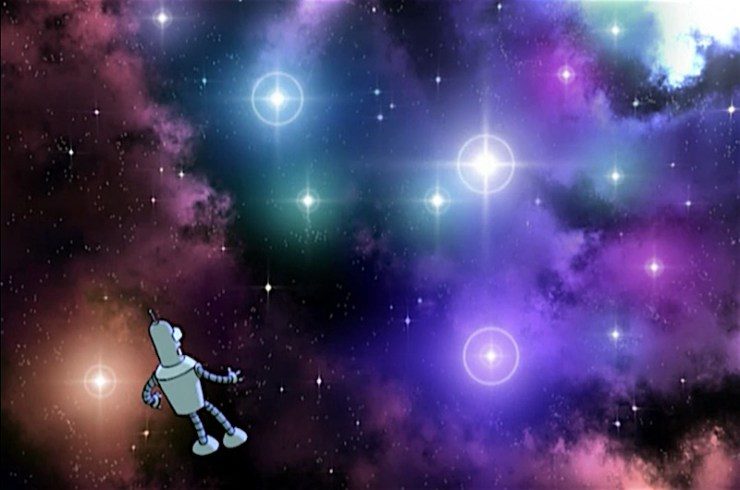
Terry Pratchett’s Small Gods. It helped reinforce the idea that not being an arse was a greater defining quality than the level of religious belief (or lack thereof) a person had.
Pretty much anything by Gene Wolfe.
Bujold’s Chalion series. It’s a fantasy series, but the line between magic and miracle is very blurred. The further in the series you get, the more the books are just about interactions with the gods of the world. My father-in-law, who is a Christian pastor, re-reads them regularly for the worldview in them.
Brad Torgersen’s The Chaplain’s War – the ability of humans to believe in what can’t be proved is the only thing that is keeping the alien invaders from wiping us out.
You might want to mention “The Final Question” by Isaac Asimov – one of the best short stories I’ve read, and it takes one of the most unique views on religion yet.
James Blish’s A Case of Conscience. Certainly, one should include everything by CS Lewis.
A lot of (most of?) Cordwainer’s Smith’s stories as well.
Religion (medieval Christianity) plays a major role in Katherine Kurtz’ Deryni books.
The Monster Hunter International series
Most of Brandon Sanderson’s work.
The Telling by Ursula K LeGuin. A refugee from a theocracy arrives on a secular planet where the old religion is persecuted. She has to reconcile her experiences as a religious minority and lesbian on earth with the rich, compelling religious life she finds secreted away.
Thank you for this post – and thank you for removing the comment that I assume was anti religious. Madeline L’engle was my introduction to true Christianity and I love seeing her talked about more. As Clark was a very big atheist I would not say that any of his books really present a positive view of religion (taking religion seriously is not a positive view necessarily) but I have not read the two stories you mention. I would put Gene Wolf in that boat also but I may be misinterpreting his work…but I am not sure anyone has interpreted them correctly.
I agree that C.S. Lewis is the big one – but he is also well known so I can see why he wouldn’t be included here.
I would suggest a look at Olaf Stapeldon’s oeuvre – there isn’t a piece that doesn’t deal with The Big Questions of purpose and community. Dobre chut!
@dwcole (#14)
Arthur C Clarke was not anti-religious, per se, as he seemed to hold a positive view of many of the Eastern religions. He also did not tend to be consistently yammering about “believers are gullible fools” in the way many non-believers tend to do on the Internet. That said, I think “The Star” was certainly anti-God, but not insulting to believers: the protagonist was most certainly not treated either as gullible or a fool.
Stabledon was a philosopher whose PhD dissertation was on ethics; I suspect that his views on religion were considerably more complex than those of any other writer who delved into sf.
Cordwainer Smith? I’ve not yet read much by him,but that is my understanding.
A Canticle for Leibowitz has been mentioned; but Walter M. Miller, Jr., was not a one-hit wonder. He wrote some very fine novellas and short stories, among which may be mentioned “Conditionally Human,” “Dark Benediction,” and “Crucifixus Etiam.”
Not yet well known outside Christian circles is the very enjoyable writing of Lars Walker. One might start with The Year of the Warrior (which inaugurates his Erling saga) and Blood and Judgment. These were published by Baen.
Tolkien’s LotR is set within a Christian framework. See Tom Shippey’s The Road to Middle-earth.
The prolific Andrew Klavan became a Christian some years ago and this is reflected in his sff-flavored thrillers.
The Catholic author and artist Michael O’Brien, author of Voyage to Alpha Centauri etc. Like Walker he doesn’t seem to be well known outside Christian circles. Readers of Mary Doria Russell might try the Voyage.
Victorian fantasist George MacDonald.
The late Richard Adams.
Connie Willis’s The Doomsday Book does a really nice job of presenting religion, looking at faith in dark times and the contrast between “religion” as presented in things done for show and true faith, shown through loving actions. It’s amazing how positive and life-affirming that manages to be in a book about the Black Death and a massive flu epidemic.
I think the problem with including CS Lewis is that, whatever positive qualities he had, he was a terrible science fiction writer. He couldn’t worldbuild (Tolkien’s biggest objection to the Narnia books is that they’re a crazy mishmash of mythological elements) and didn’t speculate scientifically, only theologically.
I do think Jim Butcher deserves a mention. His books frequently concern themselves with ethics, morality, and the nature of faith (religious or otherwise), in between the monster slaying.
How about Michael Flynn? Eifelheim comes first to mind . . .
@19: Lewis’s Space Trilogy (at least the first two books that I’ve read) are better in the worldbuilding department, even if they can’t compare to Tolkien. The worldbuilding is still very theologically driven, but it’s far more creative and different than that of the Narnia books.
I’m a Christian who used to only read books written by Christian authors, but in the past ten years or so have gravitated to, well, everything else that does not carry the “Christian” label on it.
However, two authors that I always come back to are Stephen Lawhead [some fantasy and scifi, but also historical fantasy in the vein of Guy Gavrial Kay] and Chris Walley.
Chris Walley is not well known at all, but his science fiction trilogy “Lamb Among the Stars” is amazing. Similar to how the first 200 or so pages of Memort, Sorrow, and Thorn are a bit slow, one needs to push through the first 150ish pages of the trilogy. It starts in a trite CHristian utopia that is a set up for the rest of the book, but can be a bit off putting at first.
Somewhat rehashing my previous comments on this so I can stay abreast of the new comment thread (and my thoughts haven’t changed that much since November :) )
While I do generally try to avoid getting too deep into religious conversations in ‘mixed’ company, I do mention it sometimes (I am guessing people who are regulars here are aware that I am Catholic, especially if they commit the theological faux pas of mis-identifying whose conception is actually Immaculate…(hint: not Jesus)) but I try not to make it a huge deal (even if it is for me). It’s hard to talk about such things on the internet. Not here, specifically; in general people here are pretty civil. But even though there are times I am kind of dying to dig into a meaty theme and theology/ethics/etc…I hold back sometimes (sometimes I fail, ha). In truth there are probably other venues more appropriate since it can be kind of a narrow interest and I’d probably be the only one who was interested in having that discussion.
But hey, since this post is specifically about religion, fair game I suppose :D
I’ve always appreciated Sanderson’s work on the topic – even if from a meta view we know what’s going on with the various religions, I appreciate that the various characters themselves are struggling with doubts, rigidity, compromise, at times anger/resentment, etc. I like it when religious characters are portrayed as actually being religious – in that their faith is actually something that is realistically driving their actions and thoughts (and not just set dressing)- but not fanatical, extreme, ignorant, hypocritical, faking the whole thing for power, or on the other side of the coin exceptionally pious (in other words, not some monk/priest/etc as the stock ‘religious character’) – just a normal person who is religious and trying to live that out.
The other author that comes to my mind, interestingly, is Juliet Marillier, who writes fairy tale/alternate history retellings that take place more or less in ancient Ireland, Wales, Iceland, etc when Christianity is still very new. In her books the various pagan faiths have real magic behind them and so there is often a lot of ‘culture clash’…and it would be easy to kind of fall into a trope of ‘good, englightened, egalatarian pagans’ and ‘evil, sexist, fascist Christians’ but she manages to present a pretty balanced (in my view) view of it – some of the pagan characters are assholes, and some of the Christian characters are honorable, and actually, one of her books has an ending twist that actually involved one of the characters converting (and that having a positive impact on his life) that nearly had me dropping the book in shock. I don’t know if I’d say the same thing now, but I remember feeling it was actually one of the better portrayals of the faith in a book I’d read in a long time.
Also: Tolkien :) Honestly, the way he really gets at the deep meanings of things – without really going into religion at all – is something that still moves me and that I still find new things in each time I re-read it.
Read “The People” stories by Zenna Henderson.
I would suggest that the Earth’s Children series by Jean Auel (Clan of the Cave Bear, etc.) falls into the definition of Fantasy. It certainly deals with religious issues respectfully and positively, just not from the viewpoint of Abrahamic religion.
James Blish’s Black Easter and The Day After Judgement (to be read in that order!)
You can also check the trudi caravan series Beginning with Priestess of the white who was really good. Focusing on religion and religions struggle and I felt at home with the trust into the gods that she had.